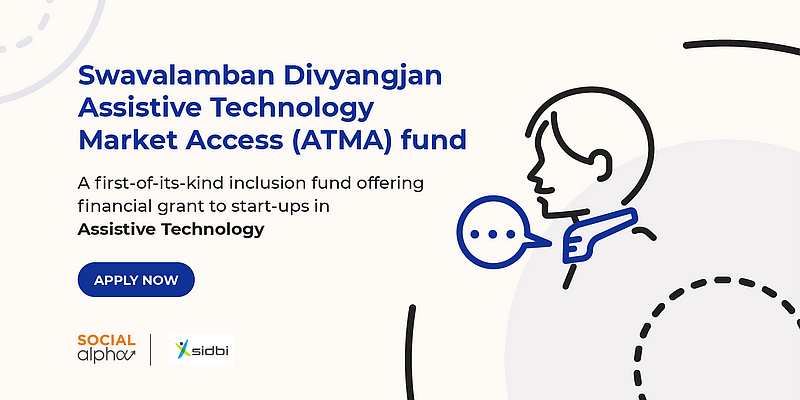According to the World Health Organisation and the World Bank, around one billion people, or 15 percent of the world’s population experience some form of disability. The number of persons with disabilities is often higher for developing countries like India.
The challenge at hand
Due to low literacy levels, social stigma, and lack of opportunities, persons with disabilities are often alienated from mainstream society. In India, a large number of children with disabilities are not able to attend school, while disabled adults face difficulties in getting jobs. As they are unable to contribute financially, families with a disabled members also tend to be economically weaker. The high cost of their healthcare ends up adding to their expenses.
With the right assistive technological intervention which can take the form of assistive products for low vision, wheelchairs, hearing aids and prosthetics, people with disabilities can lead a life of dignity. Hence it is important that innovators and entrepreneurs focus not only on user experience but also on affordability as a key matrix while developing the solutions. The fragmentation in the assistive technology value chain in India makes this sector even more challenging. The distribution channels, sales, and service mechanisms for assistive technologies are poorly developed and in most cases, non-existent.
In 2018, WHO estimated that more than 2 billion people will need at least one assistive product by 2030, with many elderly citizens needing two or more such tools. These statistics point out the need to address the challenge of accessibility and affordability of assistive technologies.
A first hand experience of the challenges assistive tech startups face
As an organisation that works towards driving economic growth, social justice and climate action through the power of entrepreneurship and innovations, Social Alpha has been working in the space of assistive technology from 2017 and is working with 16 assistive technology startups. Social Alpha has helped the startups establish a sustainable market through its NGO partner and distribution partners, improving technologies acceptability in the market through clinical trial support and regulatory expertise. It is now utilising its design for manufacturing expertise to fast-track product development and manufacturing.
According to the team, the biggest challenge that hampers growth of assistive tech startups is the low affordability and accessibility of such products. The two factors form a vicious circle. Given that the out-of-pocket expenditure for families of people with disabilities is exponentially high, assistive technologies are probably at top of their list of needs however they can’t afford them. “Low affordability among PwDs creates poor demand and hence startup are not able to achieve the economies of scale to eventually make their products affordable. This forms a vicious cycle which is hard to break for assistive tech startups on their own,” says Pulkit Aggarwal, Investment Director, Assistive Technology.
Moreover, it makes it harder for other stakeholders in the complete supply chain to find sustainability. This leads to poor distribution infrastructure, reliance on import, inability to service rural areas and a market that is mainly driven by a philanthropic model. “There is often an expectation that the product is made available free of cost to the users. Hence, if you look around you will see that a majority of the market in India relies on government bodies and schemes, charitable services, and donations to distribute assistive products to the end user. As a result of such dependence, sometimes the quality of the products gets impacted.”
These infrastructure failures and low sustainability have failed to attract innovators, entrepreneurs and risk capital in this sector. Pulkit explains, “For instance, the lack of product development and research infrastructure results in a limited number of innovations that we see in the market as compared to other sectors. There are hardly any dedicated labs for product and software development for assistive tech or adequate financial support for prototyping of assistive aids. Also, unlike the case for other tech products, access to users for product validation and feedback is extremely limited.”
A mechanism to spark a self-perpetuating cycle of positive change
All these factors make it extremely challenging for startups in the sector to design for scale and affordability, says Pulkit. Here, he believes that an immediate solution is to develop a financial mechanism that makes existing high quality technologies and solutions more affordable and accessible and allows for easy market entry for such technologies. This will pave the way for a systematic approach for assistive technologies to reach the market and promote development of sustainable financing models by the government and financial institutes. It will also lead to economies of scale by improving the market demand. “The following effect will not only lead to risk capital inflow in the assistive technology space, better quality products and improved user experience, but will also promote innovation and product development in the sector due to increased demand.”
It is towards realising these goals that Social Alpha and the Small Industries Development Bank of India (SIDBI) have joined hands to set up the Swavalamban Divyangjan Assistive Tech Market Access (ATMA) fund, a first-of-its-kind inclusion fund offering financial grants to Social Alpha-incubated startups working in the assistive technology sector. Each incubatee will have access to an implementation support of up to Rs 20 lakh. The fund will finance upto 50 percent of the product price for the initial users, while improving access to such technologies and reducing the out-of-pocket expenditure for buying these new technologies.
While access to funds of upto Rs 20 lakhs is the key highlight of the initiative, the selected startups will also be supported under Social Alpha’s Incubation Programme. The startups will receive dedicated hands-on support from Social Alpha’s team of innovators, entrepreneurs, investors and analysts with a deep domain expertise in assistive tech. This includes support w.r.t. establishing a product-market fit, and product road map and go-to-market planning
In addition, by tapping into its investor and donor network, Social Alpha will also enable syndicate funding based on specific needs across equity, debt, and grants or just follow-on funding. That apart, Social Alpha will also invest in companies whose interests align with those of its programme partners and portfolio companies. Facilitating market access for the startups is also a key aim for Social alpha, hence it will provide a sector-specific strategy in enabling market access through partnerships, channel development, introductions to potential customers – both public and private.
Reaching economies of scale would in turn help the startup reduce the price of the product for its intended end user and thereby help it empower and improve lives of more people with disabilities. The fund ultimately hopes to spark a self-perpetuating cycle of positive change that starts with reducing out-of-pocket expenditure for users and in the long run improving their standard of living through access to better education, livelihood/employment opportunities and thereby enabling them to afford high quality assistive technology solutions.
Manoj Kumar, CEO and co-founder, Social Alpha, said:
“Creating new markets in Assistive Technologies has been a big challenge and requires significant investment in ecosystem development. ATMA fund heralds a new era for the Assistive Technology sector by enabling early adoption of innovative solutions. We believe that the reduction in out-of-pocket expenditure will catalyse demand, which is essential for the long-term sustainability and growth of entrepreneurial risk taking in this sector. We are happy to partner with SIDBI as its support can help scaling this fund to include pan-India incubators while offering a much-needed boost to this sector’s research and development efforts.”
Speaking about this partnership, V Satya Venkata Rao, Deputy Managing Director, SIDBI said, “With SIDBI’s vast experience in catering to MSMEs and operating various funds, developing a social impact fund i.e., Swavalamban Divyangjan ATMA Fund comes as an opportunity to be part of this mission. “
Applications are now open for Swavalamban Divyangjan Assistive Tech Market Access (ATMA) fund
Applications are open on a rolling format basis for any individual or group of individuals, representing a startup, with an innovative idea that addresses challenges faced by persons with disabilities in India (though not exclusively). Since a key area of focus of the initiative will be on establishing marketing channels for existing products, only those who are ready to launch the product in the market are eligible to apply. A company which has applied, has to be owned by resident Indian citizen i.e. at least 51% of the capital of the company is owned beneficially by a resident Indian citizen.
The Swavalamban Divyangjan Assistive Technology Market Access (ATMA) Fund will be allotted to top four incubated startups. The selected startups will be provided with the incubation support for up to 12 months. Throughout this period, the startups will get support in establishing a market, and help in financing the product price for the initial users.
Apply for Swavalamban Divyangjan Assistive Technology Market Access (ATMA) Fund here.




![Read more about the article [Year in Review 2021] ‘Magic happens when the vision is shared’ – Top 50 quotes of the year on entrepreneurship and leadership](https://blog.digitalsevaa.com/wp-content/uploads/2021/12/Entrepreneurship-and-Leadership-1640671591383-300x150.png)





